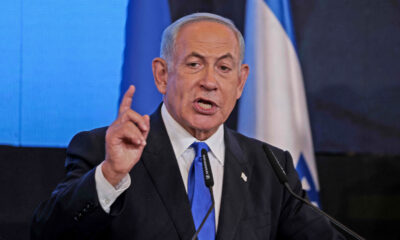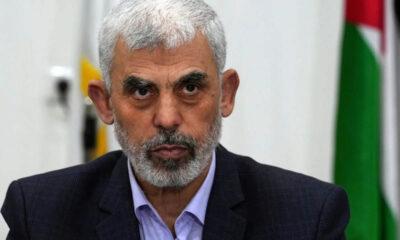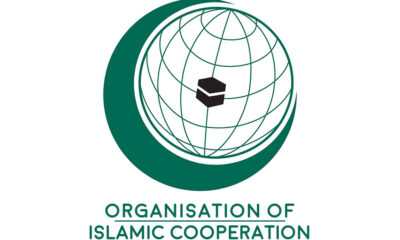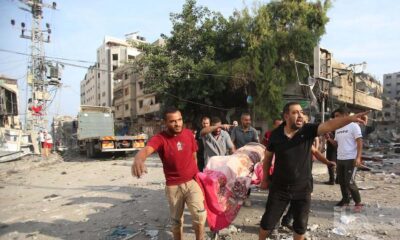International
Hamas leader’s killing risks ‘wider conflict,’ OIC chair warns
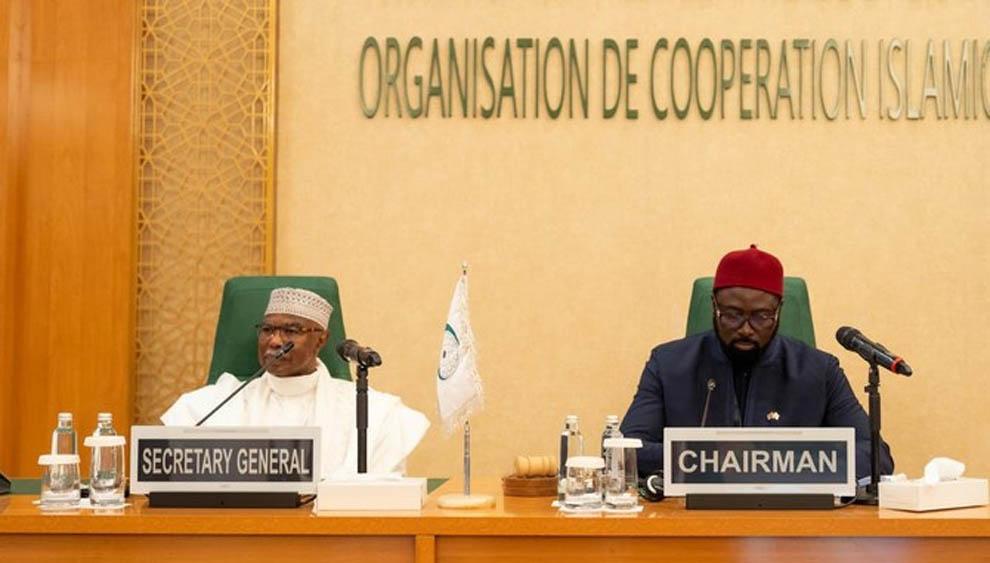
Hamas leader’s killing risks ‘wider conflict,’ OIC chair warns
RIYADH: The assassination of Hamas political leader Ismail Haniyeh risks tipping the Middle East into a “wider conflict,” the chair of the Organization of Islamic Cooperation said on Wednesday.
Speaking at an extraordinary meeting for the foreign ministers of member states, Gambian Foreign Minister Mamadou Tangara said the killing served only to “escalate the existing tensions potentially leading to a wider conflict that could involve the entire region.”
Haniyeh’s death “will not quell the Palestinian cause but rather it amplifies it, underscoring the urgency for justice and human rights for the Palestinian people,” Tangara, whose country currently chairs the OIC, said.
“The sovereignty and territorial integrity of nation states are fundamental principles underpinning the international order. Respecting these principles has profound implications and their violation equally carries significant consequences,” he said.
OIC Secretary-General Hissein Brahim Taha condemned Haniyeh’s killing and the “genocide committed by Israel in the Gaza Strip, the West Bank,” and Jerusalem.
He called on the UN Security Council to assume its responsibilities and take the necessary measures to compel Israel to respect the rule of international law and stop its aggression and attacks that threaten regional and international peace and security.
Taha said that the council should demand an immediate and comprehensive cessation of the ongoing Israeli aggression on the Gaza Strip in order to avoid the risk of full-scale regional war that would undermine the security and stability of the entire Middle East.
He stressed the need for joint efforts to compel Israel to abide by international legitimacy resolutions and said that the necessary measures should be taken to implement the recent advisory opinion issued by the International Court of Justice regarding the illegality of the Israeli occupation.
READ ALSO:
- Military, PDP supporters clash in Bauchi, one killed, six injured
- State of emergency declared in Kursk after Ukraine attack on Russia
- Immigration suspends officer begging for money at Murtala Muhammed Int’l Airport
Taha condemned the Israeli Knesset’s resolution rejecting Palestinian statehood and its designation of UNRWA as a terrorist organization. He also called for the provision of more political and financial support to UNRWA’s budget so that it can exercise its vital role in providing basic services to Palestinian refugees and contribute to alleviating the humanitarian suffering of the Palestinian people in the Gaza Strip.
Taha called on key players in the international community to sponsor a political process to end Israeli occupation and achieve peace based on the vision of the two-state solution in accordance with international legitimacy resolutions.
Saudi Deputy Foreign Minister Waleed Al-Khuraiji attended the meeting on behalf of Foreign Minister Prince Faisal bin Farhan, the Saudi Press Agency reported.
He told the summit that his government was aware of the danger of the escalating events in the Palestinian territories due to Israeli attacks and illegal practices against Palestinians inside and outside them.
He also condemned Haniyeh’s assassination as a “flagrant violation of the sovereignty of the Islamic Republic of Iran, its territorial integrity and national security, international law and the Charter of the United Nations and constitutes a threat to regional peace and security.”
Al-Khuraiji said the Kingdom condemned Israeli attacks against civilians and rejected any attack on the sovereignty of states or interference in the internal affairs of any state, in accordance with international conventions and the OIC Charter.
He expressed the Kingdom’s deep concern over the escalation of Israeli violations which have resulted in large numbers of dead and wounded civilians in the Gaza Strip and the West Bank, shortages of food, medicine and fuel and the destruction of the health sector.
He also renewed the Kingdom’s call for the international community to take effective action to hold Israeli forces fully responsible for their crimes and violations.
The Kingdom supported all efforts aimed at ending the occupation of the Palestinian territories and reaching a comprehensive solution that enabled people to establish an independent Palestinian state in accordance with international legitimacy resolutions and the Arab Peace Initiative, Al-Khuraiji said.
Hamas leader’s killing risks ‘wider conflict,’ OIC chair warns
International
Trump Halts Minnesota Immigration Crackdown After Fatal Shootings, Protests

Trump Halts Minnesota Immigration Crackdown After Fatal Shootings, Protests
The Trump administration has officially halted Operation Metro Surge, a controversial immigration enforcement operation in Minnesota, following widespread protests, political backlash, and the deaths of two U.S. citizens. The decision was announced by Tom Homan, the U.S. “border czar,” who confirmed that President Donald Trump approved ending the monthslong crackdown.
Operation Metro Surge, launched in December 2025, focused on the Minneapolis–St. Paul metropolitan area, deploying nearly 3,000 federal immigration officers at its peak. The operation aimed to detain undocumented immigrants, which the Department of Homeland Security (DHS) described as targeting “criminal illegal aliens.” However, reports indicate that many detainees had no criminal records, including children and U.S. citizens, raising concerns about the operation’s scope and fairness.
- Army University Professor Dies in Boko Haram Captivity After Nearly One Year
- MURIC Calls Proposed US Sanctions on Nigerian Muslims ‘Lopsided’
- Supreme Court Affirms Muslim Students’ Right to Worship at Rivers State University
The crackdown drew intense public opposition after anti-ICE protesters Renée Good and Alex Pretti were fatally shot during separate incidents in Minneapolis. The shootings intensified calls for accountability and prompted local and national criticism of federal enforcement tactics.
In a statement, Homan said, “I have proposed and President Trump has concurred that this surge operation conclude.” He noted that a drawdown of federal personnel had already begun, with a smaller contingent remaining temporarily to transition operations and coordinate with local authorities.
During the operation, DHS reported over 4,000 arrests, though critics highlighted the disproportionate impact on communities and families, emphasizing the humanitarian and civil liberties concerns arising from the surge.
Minnesota officials, including Governor Tim Walz and Minneapolis Mayor Jacob Frey, welcomed the decision, calling the operation an overreach that harmed communities and strained trust between law enforcement and residents. Civil rights groups also praised the halt but urged comprehensive immigration reforms to prevent future abuses.
The end of Operation Metro Surge marks a significant development in the national debate over immigration enforcement, sanctuary policies, and federal authority, highlighting the challenge of balancing border security with human rights and community safety.
Trump Halts Minnesota Immigration Crackdown After Fatal Shootings, Protests
International
Russia Escalates Digital Control with Attempted WhatsApp Block

Russia Escalates Digital Control with Attempted WhatsApp Block
WhatsApp has accused the Russian government of trying to completely block its messaging service in the country, a move aimed at steering users toward the state-backed app MAX. The Meta-owned platform said the effort, reported on February 12, 2026, threatens over 100 million users and undermines private, encrypted communication in Russia.
In a statement, WhatsApp said: “Today the Russian government attempted to fully block WhatsApp in an effort to drive people to a state-owned surveillance app. Trying to isolate over 100 million users from private and secure communication … can only lead to less safety for people in Russia. We continue to do everything we can to keep users connected.”
READ ALSO:
- Tumbler Ridge Massacre: Canada Investigates Shooter’s Mental Health, Police History
- Ex-Acting AGF Nwabuoku Admits Diverting N868.4 Million to Private Firms
- Kwankwasiyya Urges US Congress to Drop Kwankwaso’s Name from Bill
The attempt is part of a broader crackdown on foreign tech platforms in Russia. Authorities have previously restricted access to Facebook, Instagram, and targeted other services like Telegram. Reports indicate that Roskomnadzor, Russia’s communications regulator, removed WhatsApp from its national internet directory, forcing users to rely on VPNs to access the platform. Critics warn that such measures are designed to expand state surveillance and control over digital communication.
The government is actively promoting MAX, a domestic “super-app” similar to China’s WeChat, which combines messaging with other services. Rights advocates caution that the push toward MAX could compromise privacy protections that platforms like WhatsApp provide. Meanwhile, Kremlin officials have indicated that WhatsApp and other restricted apps could be restored if Meta complies with local data storage and regulatory laws.
WhatsApp’s statement emphasizes that the company will continue to work to keep its service accessible where possible, but the attempted block highlights Russia’s ongoing effort to enforce digital sovereignty and shift users toward state-controlled technology platforms.
Russia Escalates Digital Control with Attempted WhatsApp Block
International
Tumbler Ridge Massacre: Canada Investigates Shooter’s Mental Health, Police History
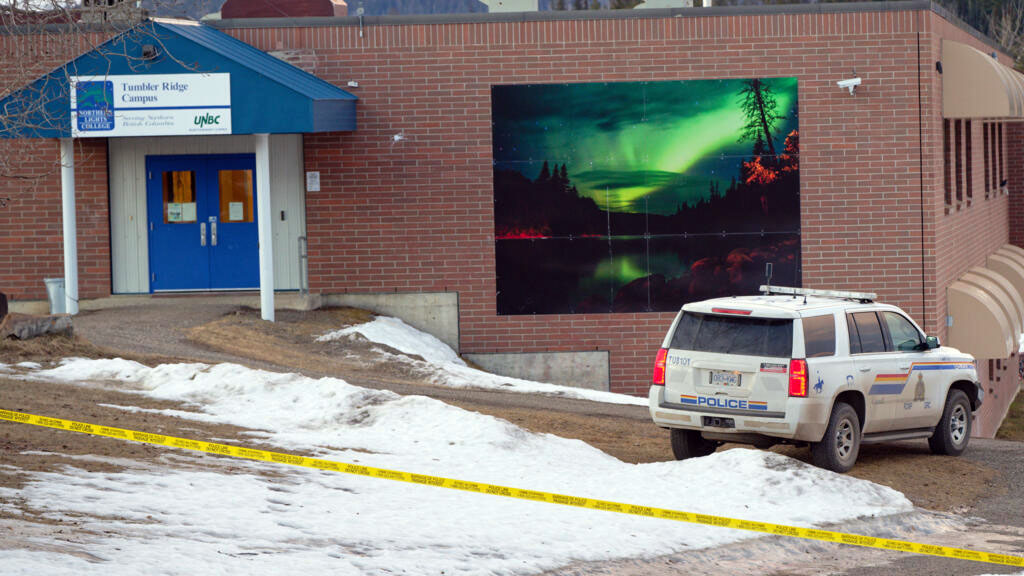
Tumbler Ridge Massacre: Canada Investigates Shooter’s Mental Health, Police History
Canadian authorities are intensifying investigations into the mental health history and prior police interactions of Jesse Van Rootselaar, the 18-year-old who carried out a deadly mass shooting in the remote mining town of Tumbler Ridge, British Columbia, on February 10, 2026. The tragedy has left the small community in mourning and raised national questions about gun control, mental health support, and law enforcement interventions.
According to RCMP Deputy Commissioner Dwayne McDonald, authorities are still unclear on the motive behind the attack, which is one of the deadliest school shootings in Canadian history. Van Rootselaar, a transgender woman who had dropped out of Tumbler Ridge Secondary School four years ago, first killed her mother and stepbrother before opening fire at the school, where she shot six more victims. The shooter later took her own life at the scene.
Investigators have confirmed that Van Rootselaar was known to police and had previous interactions with the public health system due to mental health concerns. Authorities are reviewing prior incidents, including earlier firearms seizures and her lapsed gun licence, to understand how warning signs were addressed before the massacre. British Columbia Premier David Eby said officials are working with the health system to determine “what interactions may have taken place” in the past.
READ ALSO:
- Ex-Acting AGF Nwabuoku Admits Diverting N868.4 Million to Private Firms
- Kwankwasiyya Urges US Congress to Drop Kwankwaso’s Name from Bill
- Liverpool Edge Sunderland 1-0 to Halt Impressive Home Streak
The victims include a 39-year-old female teacher and five students aged 12 and 13, with one child, 12-year-old Maya Gebala, in critical condition after trying to lock herself and classmates in a library during the attack. First responders arrived within minutes, but the scale of the violence left the tight-knit community of about 2,700 residents reeling. Hundreds gathered for a candlelight vigil to honour those killed and injured.
Prime Minister Mark Carney addressed parliament, describing Tumbler Ridge as a resilient, compassionate community of miners, teachers, and construction workers, and emphasised the need to learn from the tragedy. Flags across Canada have been lowered to half-staff for seven days in remembrance of the victims. Britain’s King Charles and Queen Camilla also expressed shock and sorrow over the massacre.
Schools in the area will remain closed for the remainder of the week as authorities continue their investigation into Van Rootselaar’s mental health background, police interactions, and access to firearms, seeking to understand how similar tragedies can be prevented in the future.
Tumbler Ridge Massacre: Canada Investigates Shooter’s Mental Health, Police History
-

 metro1 day ago
metro1 day agoIKEDC Sets Feb 20 Deadline for Customers to Submit Valid IDs or Face Disconnection
-

 Education2 days ago
Education2 days agoSupreme Court Affirms Muslim Students’ Right to Worship at Rivers State University
-

 metro22 hours ago
metro22 hours agoLagos Police Launch Manhunt for Suspect in Brutal Ajah Murder
-

 Business3 days ago
Business3 days agoDangote Refinery Slashes Petrol Price to ₦774, Ends PMS Bonus Window
-

 News22 hours ago
News22 hours agoAso Rock Goes Solar as Tinubu Orders National Grid Disconnection
-

 Business2 days ago
Business2 days agoNaira Could Trade Below ₦1,000/$ With Dangote Refinery at Full Capacity — Otedola
-

 metro3 days ago
metro3 days agoKwara, Katsina Bloodshed: TMC Condemns Attacks, Dismisses ‘Jihadist Preacher’ Claims
-

 metro1 day ago
metro1 day agoArmy University Professor Dies in Boko Haram Captivity After Nearly One Year



